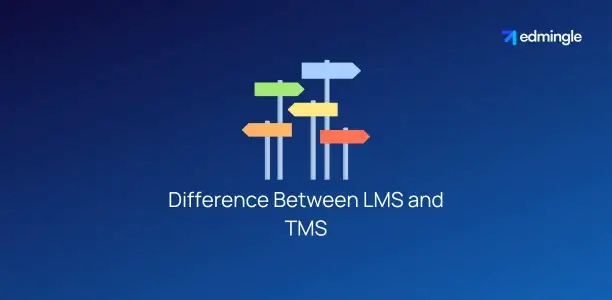
The transformation of education and training presents a plethora of choices. And not least of which is selecting the right platform to facilitate L&D.
At the heart of this decision-making process is understanding the difference between LMS and TMS.
Understanding this distinction is crucial for you to optimize your educational strategies. While ensuring that your investment yields the best possible outcomes.
In this blog, we’ll delve deep into the difference between learning management system and training management system. With the aim of arming you with the knowledge to make an informed decision.
What is the Basic Difference Between LMS and TMS?
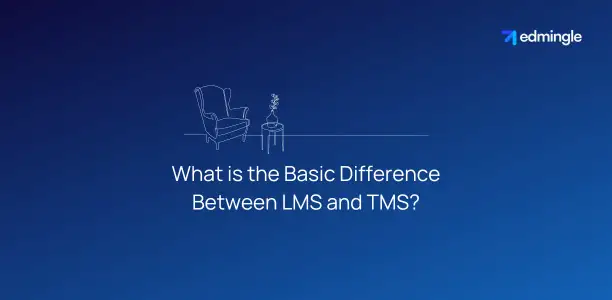
The basic difference between LMS and TMS lies in their focus.
An LMS is designed primarily for educational purposes. It facilitates online learning, course management and student assessment.
In contrast, a TMS focuses on the administrative aspects of training. This includes scheduling on time, logistics and resource allocation. Mostly for corporate training environments.
Related Article: Difference Between Learning and Training.
What is an LMS?
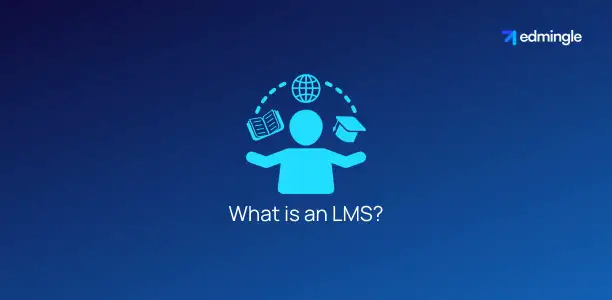
An LMS is a software application. Specifically designed to deliver, track and manage online education courses.
It serves as a digital hub for educators and learners. Providing tools for creating, administering and assessing educational content.
Primary Purpose
The primary purpose of an LMS is to enhance the learning experience. Mainly by providing a structured, accessible and scalable platform for online education.
It aims to simplify the delivery of educational courses. Thereby, enabling learners to access materials anytime and anywhere.
Read About: Edmingle’s Scalability and Flexibility.
Key Features
| Course creation and management. | Learner registration and tracking. | Grading, assessment and proctoring tools. |
| Social learning tools like forums and discussion boards. | Mobile learning compatibility. | Integration with multimedia and external resources. |
Check our blog on LMS Features for a complete list of features.
Benefits
- Improved accessibility to learning materials
- Enhanced learner engagement
- Efficient tracking of learner progress
- Scalability for any size organization
- Cost-effective education delivery
Since we talked about cost-efficiency. You might like to know how Edmingle helps reduce your operational cost by 20%.
Workflows Involved
An LMS automates and streamlines the learning process by:
- Facilitating easy course creation and content organization
- Centralizing training materials and enabling easy access for learners
- Providing tools for monitoring and reporting on learner progress
5 Best LMS of 2024
| 1.Edmingle | 2.TalentLMS | 3.iSpring Learn | 4.Canvas | 5.Absorb |
What is a TMS?
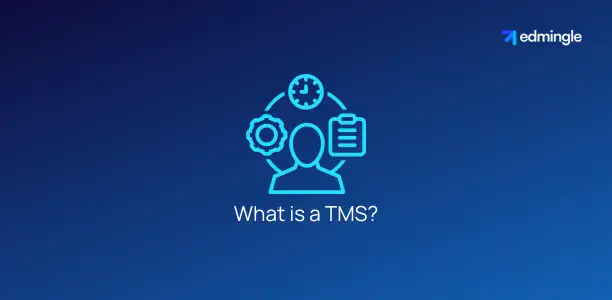
A TMS is short for training management system. It’s also a software application. But it’s focused on the administrative processes of training programs.
It helps organizations plan, execute and assess employee performance. While also streamlining the logistics and management of employee training initiatives.
Primary Purpose
The primary objective of a training management system is to manage the logistical and administrative tasks associated with training programs.
This ranges from scheduling sessions to tracking expenses. So as to ensure efficient and effective training delivery.
Also Read: Difference Between Education and Training.
Key Features
- Training scheduling and resource allocation
- Budget and expense management
- Compliance and certification tracking
- Tracking, reports and analytics
- Integration with HR systems
Benefits
| Centralized management of training operations | Improved resource allocation and utilization | Enhanced compliance and certification tracking | Detailed reporting for informed decision-making | Cost savings through efficient training management |
Workflows Involved
A training management system simplifies the management of training processes by:
- Automating scheduling, resource management and booking
- Managing budgets and tracking expenses
- Providing tools for compliance monitoring
- Reporting capabilities for effectiveness
5 Best TMS of 2024
| 1.Docebo | 2.Trainual | 3.Adobe Learning Manager (formerly Adobe Captivate Prime) | 4.Rippling | 5.isolved |
Did you know about the difference between course and training?
Key Difference Between LMS and TMS (LMS vs TMS)
The table below outlines all they key differences amidst the talk of LMS vs TMS.
| Feature | LMS | TMS |
|---|---|---|
| Focus | Educational content management and delivery. | Administrative and logistical aspects. |
| Primary Users | Educators, students and e-learning professionals. | HR departments, training administrators, training managers, corporate trainers. |
| Main Purpose | Enhance learning experience through digital courses. | Manage and optimize training operations. |
| Key Features | -Course creation and management -Assessment tools -Learner tracking -Multimedia integration | -Scheduling -Budget and expense management -Compliance tracking -Resource allocation |
| Benefits | -Improved accessibility and engagement -Efficient progress tracking -Cost-effective education delivery | -Efficient resource utilization -Enhanced compliance tracking -Cost savings |
| Ideal For | Educational institutions, online educators. | Corporations and businesses with extensive training requirements. Instructor-led training. |
| Outcome | Educational development and knowledge acquisition. | Professional development and organizational compliance. |
Hence, it’s evident that both have different applications, features and benefits.
Also Read: Difference Between Teaching and Training.
TMS vs LMS: What’s Best For You?
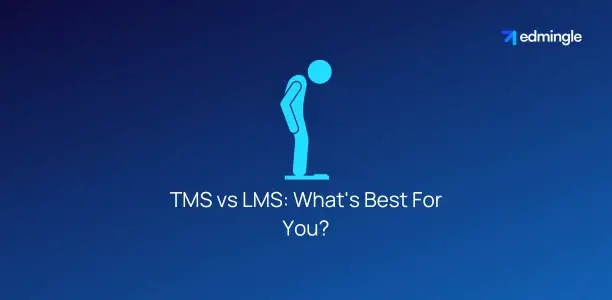
When choosing between a TMS vs LMS. The decision ultimately hinges on your specific needs and objectives.
Each system serves a unique purpose and offers distinct advantages. Hence, understanding the differences becomes crucial.
Understanding Your Needs
- If your primary goal is to manage training administration and logistics. That too, within a corporate setting. A TMS is likely the better choice.
- On the other hand. If your focus is on delivering educational content. Or tracking learner progress & providing an interactive learning environment. An LMS would be more appropriate.
Evaluating the Benefits
- Cost-Effectiveness: Both LMS and TMS can offer cost-effective solutions, but in different ways. An LMS reduces the need for physical classroom space and materials. While a TMS can cut down on administrative and logistical costs associated with training providers.
- Scalability: Consider how each system scales with your training requirements. An LMS can easily accommodate an increasing number of learners and courses. While a TMS is scalable in managing multiple training companies across various locations.
- User Engagement: An LMS often features interactive elements that engage learners. Thereby, enhancing their educational experience. A TMS isn’t focused on course content. And instead, ensures that training programs are efficiently executed and tracked.
Making the Decision
Your choice, amidst the difference between TMS and LMS, should be guided by your specific goals.
For organizations that need to manage comprehensive programs with logistical precision. A TMS offers the necessary tools and capabilities.
While for those looking to deliver educational content and engage learners in an online environment. An LMS provides the features and flexibility needed to achieve these objectives. To explore more about these platforms, you can take a free LMS demo.
In some cases, a hybrid approach may be the best solution.
Certain providers offer platforms that combine features of both an LMS and a TMS. Thereby, offering the functionalities of both systems.
By carefully assessing your needs and understanding the capabilities of each system. You can make an informed decision that aligns with your goals.
Summary on Difference Between TMS and LMS
Our exploration has offered us a clearer path. Guiding us through the intricate decisions that shape the future of learning and development.
The difference between LMS and TMS are not just technical. They are foundational.
And ultimately, your choice would encapsulate your strategic vision for growth and development.
This knowledge empowers us to tailor our educational strategies. While also ensuring that our investments not only meet the immediate needs. But also pave the way for future innovation and success.
FAQs on TMS vs LMS
1.Can a TMS replace an LMS?
Generally, no. A TMS cannot replace an LMS because they serve different purposes. A TMS is best for managing training logistics. While an LMS is designed for creating, delivering, and tracking learning content. However, some organizations may use both to cover all aspects.
2.Do TMS and LMS systems integrate with each other?
Yes, many TMS and LMS platforms can integrate with each other. Integration allows for seamless data transfer and management across both systems. Hence, enhancing efficiency and effectiveness.
3.Can a TMS handle online course delivery like an LMS?
While a TMS can manage some aspects of online course logistics, such as scheduling and resource allocation. It is not primarily designed for content delivery and interactive learning experiences like an LMS.

Leave a Reply